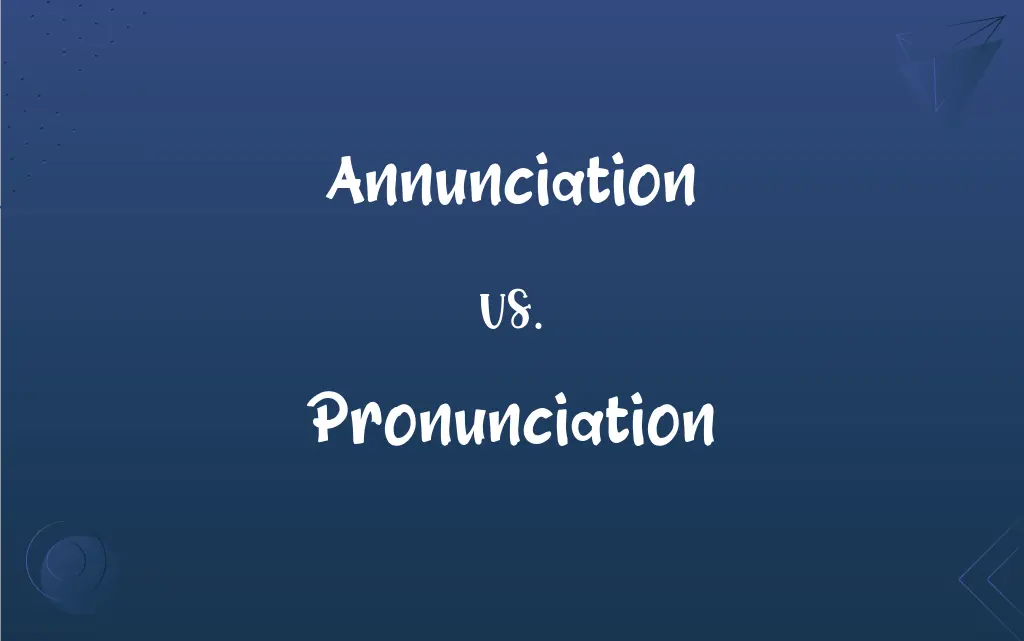Annunciation vs. Pronunciation: What's the Difference?
Edited by Aimie Carlson || By Harlon Moss || Updated on November 6, 2023
Annunciation refers to the formal announcement of something, while pronunciation is the way in which words are made to sound when spoken.

Key Differences
Annunciation is the act of announcing or making something known formally or with authority. It typically involves a declaration of considerable importance or gravity. The term is often associated with religious or ceremonial proclamations, where the formal nature of the announcement is emphasized.
Pronunciation, in contrast, concerns the standard way in which a word is made to sound when spoken. It is the act of producing the sounds of speech, including articulation, stress, and intonation. Pronunciation can vary by region and by language, and it is an essential aspect of effective verbal communication.
While annunciation implies a certain level of solemnity and formality in the declaration, pronunciation is a fundamental part of everyday speech and language learning. One could annunciate, or declare, the correct pronunciation of a word, thus using both concepts in one action.
Annunciation can be a singular, momentous event, such as the Annunciation in Christianity when the birth of Jesus Christ was announced by the angel Gabriel to the Virgin Mary. Pronunciation, however, is a daily practice and an integral part of linguistic education and language use, without any particular association with formality or ceremony.
Both annunciation and pronunciation are important in different contexts. Annunciation is critical for conveying significant messages with the appropriate level of formality, whereas pronunciation is key to being understood and to understanding others in oral communication.
ADVERTISEMENT
Comparison Chart
Definition
Formal announcement.
The way a word is spoken.
Context
Often ceremonial or official.
Everyday speech and language learning.
Usage
Can be a one-time event.
Practiced regularly.
Association
With formality and importance.
With communication and linguistic correctness.
Examples
Religious proclamations, royal decrees.
Dialects, language classes, phonetics.
ADVERTISEMENT
Annunciation and Pronunciation Definitions
Annunciation
The formal announcement of a significant event.
The annunciation of the new king was celebrated throughout the kingdom.
Pronunciation
The way in which a word is spoken.
His pronunciation of 'aluminum' revealed his British upbringing.
Annunciation
In Christianity, the announcement of the Incarnation by the angel Gabriel to Mary.
Paintings of the Annunciation often show Gabriel with a lily.
Pronunciation
The standard set for the sounds of letters and words.
The teacher corrected her student's pronunciation of 'genre.'
Annunciation
The act of making a formal public announcement.
The annunciation was made that the library would be closed for renovations.
Pronunciation
The sounds used when saying a word, especially when considered correct.
The dictionary provided the pronunciation for each new term.
Annunciation
A formal declaration, especially one regarding a matter of importance.
The annunciation of the ceasefire brought relief to the citizens.
Pronunciation
The act or manner of pronouncing words.
Proper pronunciation is crucial for clear communication.
Annunciation
A proclamation or declaration with authority.
The mayor's annunciation of the policy changes was met with applause.
Pronunciation
The part of linguistics that deals with sounds and their utterance.
Learning the pronunciation of a new language can be challenging.
Annunciation
The act of announcing.
Pronunciation
The act or manner of pronouncing words; utterance of speech.
Annunciation
An announcement; a proclamation.
Pronunciation
A way of speaking a word, especially a way that is accepted or generally understood.
Pronunciation
A graphic representation of the way a word is spoken, using phonetic symbols.
FAQs
What is pronunciation?
The way in which words are spoken and sounded out.
Can annunciation have religious connotations?
Yes, especially in the context of Christianity.
What's an example of annunciation in a sentence?
"The official annunciation of the event was due tomorrow."
What does annunciation mean?
A formal public announcement or proclamation.
Does annunciation always have to be formal?
It usually denotes some level of formality.
Are there different methods to teach pronunciation?
Yes, such as phonetic training and listening practice.
Does pronunciation affect meaning?
Yes, mispronunciation can lead to misunderstandings.
Can pronunciation vary regionally?
Absolutely, pronunciation can differ widely by region.
Is annunciation commonly used in daily conversation?
No, it's more specialized and less common than pronunciation.
How often is the term annunciation used?
Less frequently, often in formal or religious contexts.
Is pronunciation important in learning a new language?
Yes, correct pronunciation is essential for clear communication.
Why is pronunciation challenging for non-native speakers?
Due to differing sounds not present in their native language.
Are there rules for pronunciation?
Yes, dictated by linguistic norms and standards.
Is annunciation the same as enunciation?
No, enunciation refers to the clarity of speaking, not the act of announcing.
Can technology help with pronunciation?
Yes, with tools like pronunciation guides and speech recognition.
How can one improve their pronunciation?
Through practice, listening, and phonetic training.
Is there a holiday related to annunciation?
Yes, the Feast of the Annunciation in Christianity.
What historical events might be known for annunciation?
Royal edicts and religious proclamations.
Can pronunciation be subjective?
To some extent, within different dialects and accents.
Is annunciation more about content or form?
It's about both the formality of the announcement and the content being announced.
About Author
Written by
Harlon MossHarlon is a seasoned quality moderator and accomplished content writer for Difference Wiki. An alumnus of the prestigious University of California, he earned his degree in Computer Science. Leveraging his academic background, Harlon brings a meticulous and informed perspective to his work, ensuring content accuracy and excellence.
Edited by
Aimie CarlsonAimie Carlson, holding a master's degree in English literature, is a fervent English language enthusiast. She lends her writing talents to Difference Wiki, a prominent website that specializes in comparisons, offering readers insightful analyses that both captivate and inform.































































